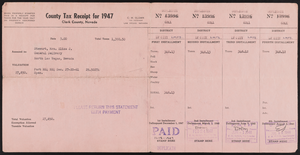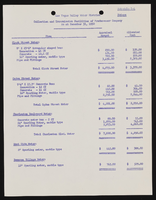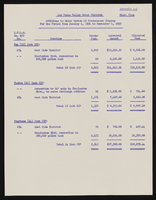Search the Special Collections and Archives Portal
Search Results
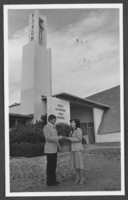
Photograph of Gary Meyer and Mary Kincaid, North Las Vegas, March 2, 1983
Date
1983-03-02
Archival Collection
Description
Gary Meyer, Principal of Faith Lutheran High School, and Mary Kincaid, Chairman of the School board, standing in front of the Faith Lutheran High School in North Las Vegas, Nevada. They are "kicking off" ticket sales for a benefit performance for the school. Individual creators credit goes to Ken Bouton.
Image
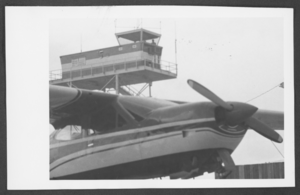
Photograph of a plane and the control tower at the North Las Vegas Air Terminal, North Las Vegas, Nevada, circa late 1960s
Date
1965 to 1969
Archival Collection
Description
A view of the control tower at the North Las Vegas Air Terminal, North Las Vegas, Nevada, circa late 1960s.
Image
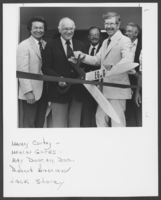
Photograph of the ribbon cutting ceremony for the Edgerton, Germeshausen, & Grier general technical services building, North Las Vegas, Nevada, August 11, 1981
Date
1981-08-11
Archival Collection
Description
The ribbon-cutting for ceremony for the Edgerton, Germeshausen, & Grier general technical services building, North Las Vegas, Nevada, August 11, 1981. Pictured L-R: Manny Cortez; Mahlon Gates; Ray Duncan, Department of Energy; Robert Hammon; Jack Storey.
Image
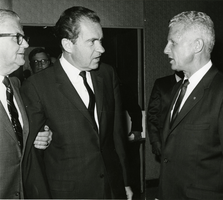
Photograph of Richard Nixon, William L. Taylor and John Gleason, Las Vegas, circa 1969-1974
Date
1969 to 1974
Archival Collection
Description
From left to right, John Gleason, the National Director Boys Clubs of America; President Richard M. Nixon; and Mayor of North Las Vegas William L. Taylor in Las Vegas, Nevada.
Image
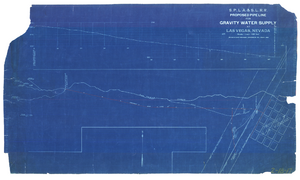
Blueprint showing proposed pipeline for gravity water supply at Las Vegas, Nevada, February 16, 1905
Date
1905-02-16
Description
'Office of Chief Engineer, Los Angeles, Cal., Feb. 16, 1905.' '2-18-17' hand-printed in lower right corner. Proposed pipeline is printed in red. Scale [1:6,000]. 1 inch to 500 feet. San Pedro, Los Angeles & Salt Lake Railroad Company. Office of Chief Engineer
Image
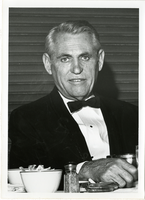
Photograph of Mayor Oran K. Gragson, 1967
Date
1967
Archival Collection
Description
Las Vegas Mayor Oran K. Gragson, as photographed in 1967. The location where the photograph was taken is unknown. Oran Kenneth Gragson (February 14, 1911 – October 7, 2002) was an American businessman and politician. He was the longest-serving mayor of Las Vegas, Nevada, from 1959 to 1975. Gragson, a member of the Republican Party, was a small business owner who was elected Mayor on a reform platform against police corruption and for equal opportunity for people of all socio-economic and racial categories. Gragson died in a Las Vegas hospice on October 7, 2002, at the age of 91. The Oran K. Gragson Elementary School located at 555 N. Honolulu Street, Las Vegas, NV 89110 was named in his honor.
Image
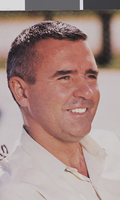
Postcard of former Nevada Governor Paul Laxalt, 1966
Date
1966
Archival Collection
Description
Former Nevada Governor Paul Laxalt, as photographed in 1966. The location where the photograph was taken in unknown. Paul Dominique Laxalt (born August 2, 1922) was Governor of Nevada from 1967 to 1971 and a United States Senator from 1974 to 1987. In the media, the words "son of a Basque sheepherder" often accompanied his name. He was one of Ronald Reagan's closest friends in politics. In fact, after Reagan was elected President in 1980, the national press began to refer to Laxalt as "The First Friend." He is the older brother of Robert Laxalt, who was a noted and prolific writer. He is a member of the Republican Party.
Image
Pagination
Refine my results
Content Type
Creator or Contributor
Subject
Archival Collection
Digital Project
Resource Type
Year
Material Type
Place
Language
Records Classification

